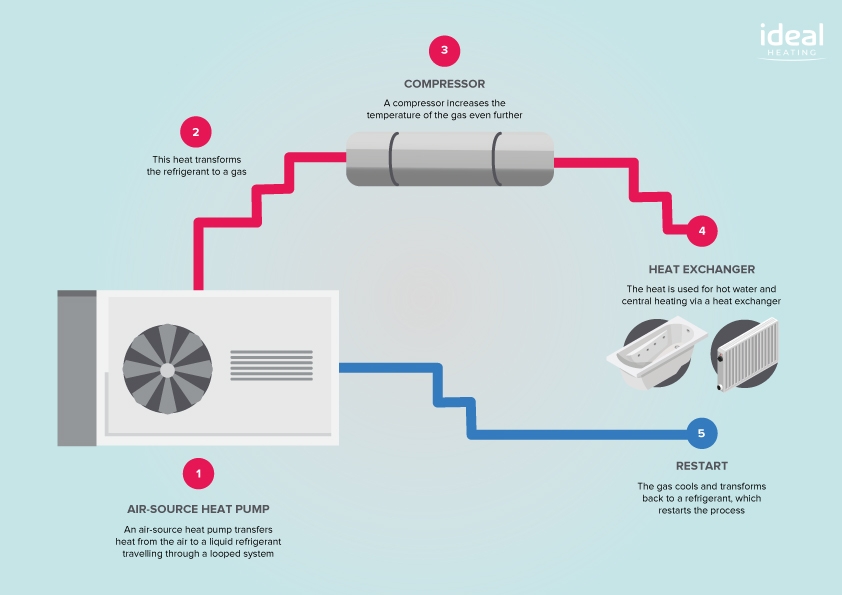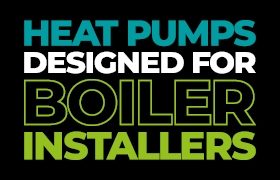An Expert Guide to Air Source Heat Pumps in the UK
As the world moves towards more eco-friendly heating solutions, air source heat pumps have emerged as a new heating technology for UK homes.
But what are the tangible benefits of these high-tech appliances? How do they work? And can they really replace your trusty boiler?
In this guide, learn everything you need to know about air source heat pumps, including advantages, average running costs and lifespan, to help you decide whether this heating solution is suitable for your home.
What is an Air Source Heat Pump?
An air source heat pump (ASHP) is a renewable heating system that extracts heat from the outside air and transfers it into your home. An ASHP absorbs warmth from the air, even in cold temperatures, and uses it to heat water for your central heating system.
What are the Different Types of Heat Pumps?
There are two main types of air source heat pumps: water and air heat pumps. Here are the main differences between the two:
Air Source Heat Pump (ASHP)
- Extracts heat from the air.
- Efficiency may vary based on outdoor temperature and heat pump performance.
- Easier and more cost-effective installation than WSHP.
- Suitable for a broader range of geographic locations.
- Generally simpler maintenance requirements.
Water Source Heat Pump (WSHP)
- Extracts heat from water sources (lakes, rivers, wells).
- Consistent temperature due to the nature of water sources, benefitting homes in colder climates.
- Installation can be complex and costly, requiring water infrastructure.
- Potential maintenance considerations related to water quality.
How Does an Air Source Heat Pump Work?
Air source heat pumps operate on the principles of thermodynamics. This is the science behind how heat, temperature and energy transfer from one place to another.
They consist of an evaporator, compressor, condenser, and expansion valve that work in a continuous loop.
- Air is drawn in by the fan from outside, passing over the refrigerant fluid.
- The refrigerant captures heat from the air and becomes warm vapour.
- The vapour then passes through a compressor, producing hot refrigerant and usable heat.
- Heat in the hot refrigerant is then transferred to the heating and hot water cylinder through a heat exchanger.
- Once the heat has been transferred to the house, the refrigerant passes through an expansion valve which reduces its temperature, making it cold again and enabling it to capture heat from the air, continuing the cycle.

What Temperature Does an Air Source Heat Pump Produce?
Air source heat pumps are typically set to produce water up to 55°C, making them suitable for space heating and domestic hot water needs.
This is one of the reasons why ASHPs are becoming increasingly popular as a more sustainable heating solution within UK homes.
How Does an Air Source Heat Pump Work in Winter?
We know what you’re thinking. If a heat pump draws its warmth from the air, surely this would deem it ineffective during winter? Yet, this isn't the case due to the nature of ASHP technology.
Contrary to common misconceptions, ASHPs can operate efficiently in winter conditions. Modern systems are designed to extract heat even from cold air, ensuring a reliable heat source for your home throughout the colder months.
This is possible because the refrigerant flowing around the heat pump’s system can absorb heat from the air even in temperatures lower than -20°C.
What Are the Advantages and Disadvantages of Air Source Heat Pumps?
Before you can decide whether to invest in an air heat pump for your home, there are a range of benefits and drawbacks that are good to understand.
Advantages
- Energy Efficiency: ASHPs are highly efficient and provide significantly more heat output than the electricity they consume.
Some models offer up to 3-4 units of heat for every unit of electricity (300-400% efficiency). This is much higher than fossil fuel heating systems like conventional boilers, which can offer anything from 0.7-0.9 units of heat per unit of fuel (70-90% efficiency).
- Sustainable Heating: They harness heat from the air, a renewable resource, and can be powered by electricity generated from renewable sources.
- Lower Carbon Emissions: ASHPs contribute to reducing carbon emissions compared to traditional, fossil-fuel-powered heating systems.
- Space Requirements: Compared to ground-source heat pumps and water-source heat pumps, ASHPs require much less space.
Disadvantages:
- Initial Cost: The upfront cost of purchasing and installing an ASHP can be higher than traditional systems.
- Weather Dependency: The system's efficiency may vary based on external temperatures.
- Space Requirements: ASHPs require a small amount of space outdoors, which can rule them out for properties like apartments. Sufficient space is also needed for a hot water cylinder; the space needed can vary depending on the size of the property.
Performing a quick side-by-side comparison, it’s clear to see that ASHPs provide an eco-friendly alternative to conventional heating systems.
Can I Get a Heat Pump Through the Government’s Boiler Upgrade Scheme?
The UK government's Boiler Upgrade Scheme offers financial incentives for homeowners to upgrade to energy-efficient heating systems. Air source heat pumps are eligible for this scheme, providing a cost-effective way to make your home more sustainable.
If eligible for the scheme, you could be granted the following financial benefits:
- £7,500 towards an air source heat pump
- £7,500 towards a ground source heat pump (including water source heat pumps and those on shared ground loops)
- £5,000 towards a biomass boiler.
As it stands, the scheme allows for up to one grant per property. Want to know if you could be entitled to this financial aid? Check if you are eligible on the official GOV site or read Ideal Heating’s blog, which covers everything we know about the new boiler upgrade scheme.
How Much Does an Air Source Heat Pump Cost?
The cost of an ASHP installation can vary significantly based on various factors, such as the type of system, your property's size, and existing heating infrastructure. On average, installations may range anywhere from £3,000 to £18,000.
How Much Do Air Source Heat Pumps Cost to Run?
ASHPs are generally more cost-effective to run than traditional heating systems. Their efficiency contributes to lower energy bills, and with the increasing focus on renewable energy, prices are expected to become more competitive in the near future.
According to recent studies from Which, heat pumps could soon become the most inexpensive way to heat your home:
“With the right combination, households could install a heat pump for as little as £500 and save more than £500 a year on bills.”
At a time when the nation is actively looking for ways to reduce our carbon footprint and prioritise sustainability, ASHPs could be the answer, providing greener heating for homes worldwide.
How Long Does an Air Source Heat Pump Last?
With proper maintenance and regular servicing, air source heat pumps can last up to 20 years or more.
Here are some key considerations that can influence their lifespan:
- Quality of Installation: Proper installation by qualified professionals is crucial for the heat pump's performance. Poor installation can lead to inefficiencies.
- Maintenance: Regular maintenance, such as cleaning filters, checking refrigerant levels, and inspecting components, is essential to extend the lifespan of the heat pump.
- Brand and Quality: The quality of the heat pump itself, including the accompanying components used, can impact its durability. Higher-quality units may last longer and perform more effectively.
How Much Electricity Does an Air Source Heat Pump Use?
The electricity consumption of ASHPs depends on a number of factors, such as the system's size and efficiency. However, they typically use less electricity than traditional electric heating systems.
Heat pump costs have decreased in recent years and are predicted to continue to drop further. According to Octopus Energy's latest running cost reports, it costs around £50 more a year to ditch traditional, non-eco-friendly boilers based on the October price cap prices. This figure is due to the higher current price of electricity versus gas, so it may change over time in line with the energy market and the rise in renewable energy.
Many energy providers also offer heavy discounts to those with heat pumps who opt for specially designed smart tariffs. Savings range from £85 or more a year, depending on your provider.
How Easy is it to Install an Air Source Heat Pump?
The installation process for an air source heat pump involves the expertise of trained professionals. While the complexity varies, a skilled installer can complete the job quickly and efficiently. Here are some of the things they might consider:
- System Complexity: The complexity of the installation can depend on factors such as the type and model of the heat pump, the existing heating system, and the layout of the property. Some installations may be more straightforward, while others may require additional considerations.
- Site Assessment: A thorough site assessment is necessary before installation. This includes evaluating the available space, electrical infrastructure, and insulation levels. Site-specific factors can impact the installation process.
- Regulatory Compliance: Compliance with local building codes and regulations is crucial. Installers need to ensure that the installation meets safety standards and legal requirements.
- Training and Certification: In order for a successful installation, certified installers should be familiar with the specific heat pump model and stay updated on industry best practices.
What Size Air Source Heat Pump Do I Need?
Determining the right size for your air source heat pump is crucial for peak performance and efficiency. The main factor is the size of your property alongside the heat demand influences the system's size. For more information, get in touch with our experts.
Is a Heat Pump the Right Choice for My Home?
The suitability of an air source heat pump depends on your home's specific requirements. Your home’s existing insulation, available space and installation costs all play a role.
If you’d like to discuss this further, our Ideal Heating experts will be happy to chat with you to assess whether a heat pump is the right choice for your home. Contact us today.
Myth-busting Air Source Heat Pumps
There are several myths that surround air source heat pumps. The main three misconceptions are that:
- They are ineffective during winter
- They are more expensive to run than traditional boilers
- They are very noisy.
In reality, and as outlined above, modern ASHPs are designed to tackle these challenges, providing reliable, cost-effective and quiet heating solutions for your home.
Not only does its advanced technology allow the device to perform efficiently in cold temperatures, but it also lets you save money on your annual energy bills. Sound levels are also low to medium - between 60 to 70 dB.
Why Choose Ideal Heating for Your Air Source Heat Pump?
Ideal Heating is trusted by over 4 million UK households to heat their homes.
With our commitment to quality and sustainability and unique understanding of the British climate, we offer a range of air source heat pumps designed to meet the diverse needs of UK homeowners, providing dependable heat, snow or shine.
From professional installations to ongoing advice and support, Ideal Heating has everything you need to seamlessly transition to eco-friendly heating.
As technology advances and government incentives become more prevalent, now is an ideal time to explore the benefits of air-source heat pumps for your home.
If you want greener, more cost-effective heating, contact us today, and our helpful advisors will be happy to take you through our range of air source heat pumps.





